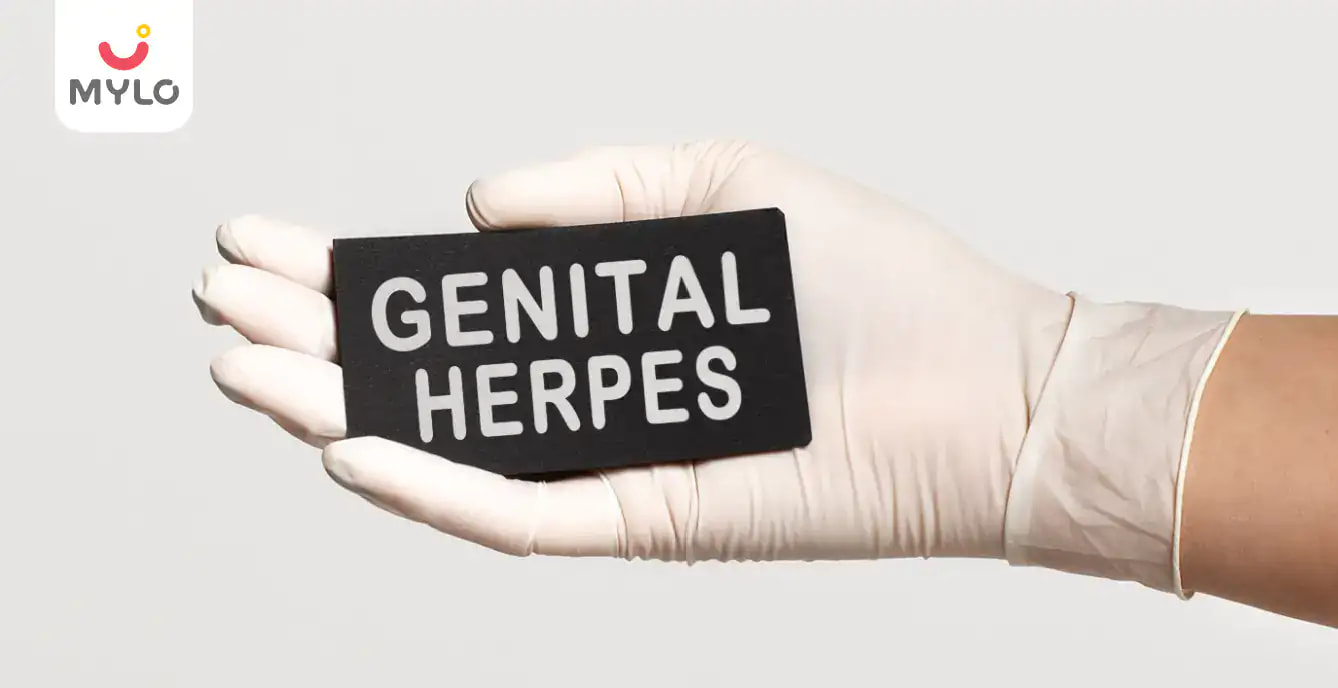- Home

- Illnesses & Infections

- Genital Herpes: Causes, Symptoms, Risks & Treatment
In this Article
Illnesses & Infections
Genital Herpes: Causes, Symptoms, Risks & Treatment
Updated on 31 May 2023
Genital herpes also known as herpes genitalis is a common sexually transmitted infection caused by the herpes simplex virus (HSV). It is often transmitted through skin-to-skin contact during sexual activity. Some people despite being infected with the virus may have no or very mild symptoms while others may experience symptoms like itching, swelling or painful blisters.
In this article, we will discuss what is genital herpes, the symptoms of herpes genitalis, its causes, risks, diagnosis, treatment and much more.
What is genital herpes?
Genital herpes is a sexually transmitted infection (STI) caused by the herpes simplex virus. It can cause herpetic sores, which are fluid-filled painful blisters that can tear open and ooze fluid. It can be a painful infection for some while others may not even know they have genital herpes.
Causes of genital herpes
Herpes genitalis is caused by two type of the herpes simplex virus (HSV):
1. HSV-1
Genital herpes caused by HSV-1 usually causes cold sores. However, it may also cause genital herpes.
2. HSV-2
HSV-2 is generally responsible for causing genital herpes, but it can sometimes also cause cold sores.
The viruses can enter the body through mucous membranes that can be found in your nose, mouth and genitals or skin abrasions. Once the virus is inside the body, it incorporates itself into cells and multiplies easily, making it hard to treat. HSV can be found in saliva, semen and vaginal secretions.
Symptoms of genital herpes
Most people with HSV may not even know they have it as they may have no or very mild symptoms. Symptoms usually begin to show around 2-12 days after exposure. Genital herpes symptoms include:
-
Itching or pain around the genitals
-
Small blisters or bumps around the genitals, anus or mouth
-
Painful ulcers which may form when blisters rupture and ooze fluid
-
Painful urination
-
Discharge from the urethra or vagina
It is also common to experience flu-like symptoms during the first outbreak such as headache, body aches, fever and swollen lymph nodes in the groin.
The herpes blisters or sores can develop on or in the buttocks, thighs, rectum, anus, urethra, vulva, vagina, cervix, penis, scrotum or mouth.
You may like : Urinary Tract Infection (UTI): Causes, Symptoms & Treatment
Diagnosis of genital herpes
A doctor can typically diagnose genital herpes by a visual examination of the herpes blister. A doctor may also confirm their diagnosis through a laboratory test instead. A blood test can help diagnose HSV before an outbreak occurs. However, if there are no symptoms and there hasn’t been exposure to the virus, it’s not necessary to be screened for HSV.
Treatment for genital herpes
Unfortunately, there is no cure for genital herpes simplex viruses, but treatment can help reduce the outbreaks. After a diagnosis has been confirmed by the doctor, they will recommend you some medications to help with the symptoms and reduce future outbreaks. Antiviral drugs can help accelerate the healing of sores and reduce pain. Medications taken at the first signs of an outbreak can also help reduce the symptoms.
Risk of genital herpes
The risk of genital herpes can increase in certain situations such as:
-
Having oral, vaginal or anal sex with someone who has genital herpes
-
Not using condoms or other protection while having sex
-
Having a compromised immune system due to another illness or STI
How genital herpes is transmitted?
Genital herpes can be transmitted through sexual contact, including vaginal or anal sex and any other activity that involves contact between genitals. It is also possible to contract HSV infection through oral sex, which can spread to genital and anal areas. HSV infection is usually transmitted through skin-to-skin contact, however, the virus may also be present in semen, saliva and vaginal secretions.
How to prevent genital herpes?
Sexually active people can prevent or lower their risk of genital herpes by:
-
Using condoms or other barrier methods every time they have sex
-
Avoiding having sex with someone who displays symptoms of herpes
-
Talking to a sexual partner about their STI status
What to do if you test positive for genital herpes?
If a person tests positive for genital herpes, they should consult a doctor immediately. Although it cannot be cured, medications can help reduce the symptoms and lower the risk of outbreaks. Frequent and severe outbreaks might be a sign of a compromised immune system. A doctor can help determine the underlying cause for this. It’s recommended to avoid sex if there’s a genital herpes outbreak. To reduce the chances of transmission, use barrier methods such as condoms and dental dams during sexual activity.
What happens if genital herpes is not treated?
Genital herpes, usually, does not always require treatment, however, medications can help reduce the severity of symptoms and the possibility of outbreaks. In some rare cases, herpes can lead to complications but it doesn’t get worse over time.
What should I be aware of if I have genital herpes and am pregnant?
It’s perfectly normal to be concerned about your baby’s health if you contract genital herpes or any other STI during pregnancy. In case of an active outbreak, HSV can be transmitted to the baby during vaginal delivery. It’s important to discuss with your doctor if you have genital herpes and determine a safe course of treatment. The doctor may also suggest delivering the baby through a C-section to minimse the chances of the baby contracting the HSV.



Written by
Ravish Goyal
Official account of Mylo Editor
Read MoreGet baby's diet chart, and growth tips

Related Articles
Related Questions
Hello frnds..still no pain...doctor said head fix nhi hua hai..bt vagina me pain hai aur back pain bhi... anyone having same issues??

Kon kon c chije aisi hai jo pregnancy mei gas acidity jalan karti hain... Koi btayega plz bcz mujhe aksar khane ke baad hi samagh aata hai ki is chij se gas acidity jalan ho gyi hai. Please share your knowledge

I am 13 week pregnancy. Anyone having Storione-xt tablet. It better to have morning or night ???

Hlo to be moms....i hv a query...in my 9.5 wk i feel body joint pain like in ankle, knee, wrist, shoulder, toes....pain intensity is high...i cnt sleep....what should i do pls help....cn i cosult my doc.

Influenza and boostrix injection kisiko laga hai kya 8 month pregnancy me and q lagta hai ye plz reply me

RECENTLY PUBLISHED ARTICLES
our most recent articles

Ayurveda & Homeopathy
Ashokarishta: All You Need to Know About This Miracle Tonic for Women

Leisure
10 Amazon Prime Movies to Look Forward to in 2023

TV & OTT
10 Best Netflix Movies to Watch Out For in 2023

Yoga
Fertility Yoga: A Natural Solution to Boost Your Chances of Conception

Periods
How to Get Regular Periods Naturally: Ayurvedic Herbs, Lifestyle Changes & Homeopathy

Women Specific Issues
Lodhra: The Wonder Herb for Women's Health
- Malabsorption Syndrome: Types, Causes, Symptoms, & Treatment
- Top 10 Short Bedtime Stories for Kids
- RH Incompatibility in Pregnancy - Causes, Symptoms & Treatments
- Patent Ductus Arteriosus (PDA) Symptoms & Treatment
- Why Babies Cry After Birth?
- IVF Process Step by Step Timeline: What to Expect During Your Fertility Journey
- Tracheoesophageal Fistula: Causes, Symptoms, Risks & Treatment
- Stillbirth: Cause, Symptoms, Risks & Prevention
- Giant Congenital Melanocytic Nevus: Causes, Symptoms, & Treatment
- Tokophobia: How to Manage Your Phobia of Pregnancy & Childbirth
- Low BP in Pregnancy: Symptoms, Effects & Treatments
- Helping your twins to sleep at the same time
- Baby Brain Development: What You Should Know
- Tummy Tuck (Abdominoplasty) Procedure, Risks, Preparation & Recovery


AWARDS AND RECOGNITION
Mylo wins Forbes D2C Disruptor award
Mylo wins The Economic Times Promising Brands 2022
AS SEEN IN
















At Mylo, we help young parents raise happy and healthy families with our innovative new-age solutions:
- Mylo Care: Effective and science-backed personal care and wellness solutions for a joyful you.
- Mylo Baby: Science-backed, gentle and effective personal care & hygiene range for your little one.
- Mylo Community: Trusted and empathetic community of 10mn+ parents and experts.
Product Categories
baby carrier | baby soap | baby wipes | stretch marks cream | baby cream | baby shampoo | baby massage oil | baby hair oil | stretch marks oil | baby body wash | baby powder | baby lotion | diaper rash cream | newborn diapers | teether | baby kajal | baby diapers | cloth diapers |





